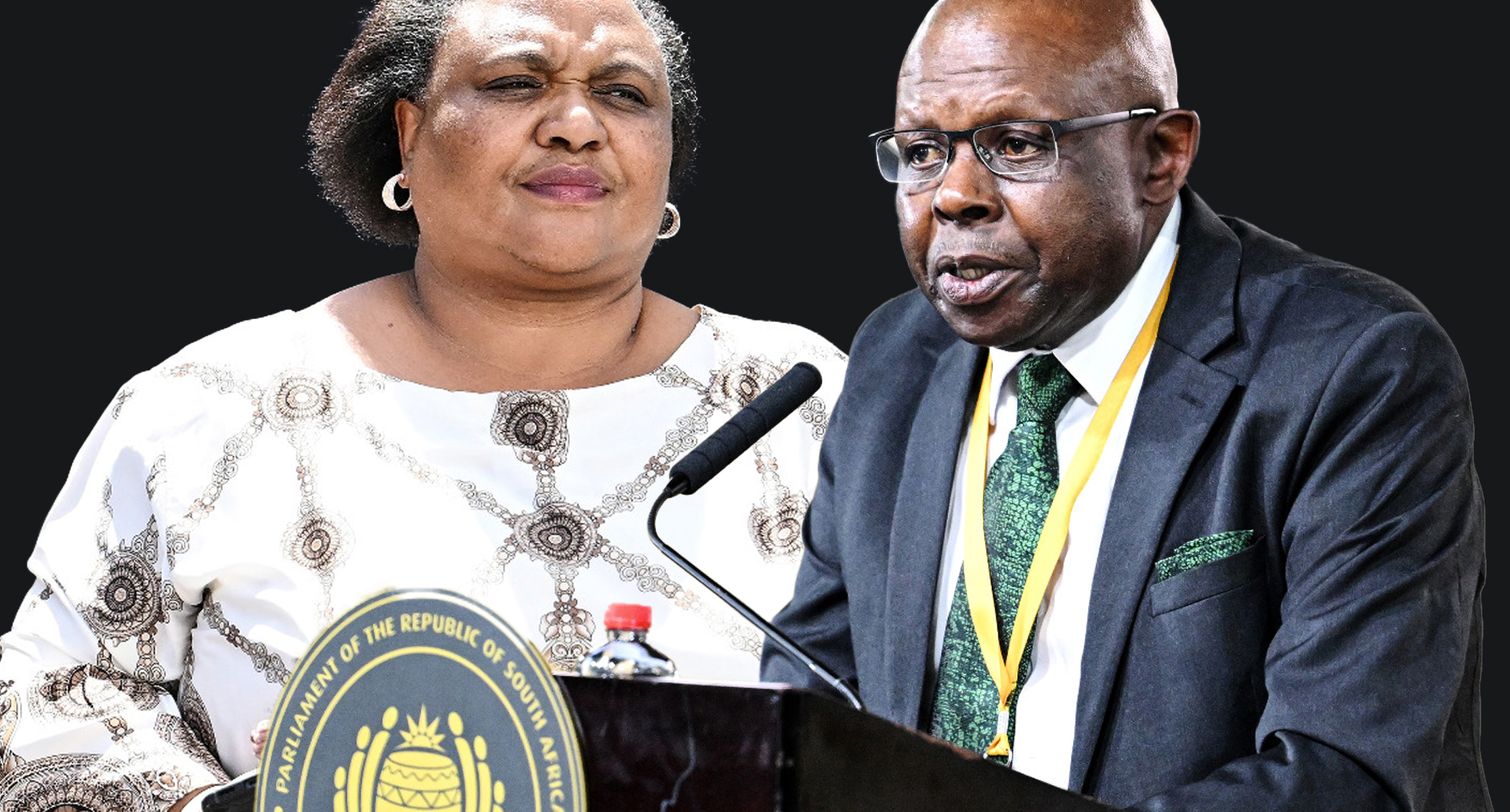Impeached former Western Cape Judge President John Hlophe’s election on 9 July 2024 by the National Assembly (NA) to serve as the uMkhonto Wesizwe (MK) party’s representative on the Judicial Service Commission (JSC) is being contested in the Western Cape Division of the High Court.
Coincidentally, this week a virtual JSC tribunal heard details of Hlophe’s alleged assault in 2019 on Judge Mushtak Parker.
Parker faces charges of misconduct, including lying under oath, concerning the alleged assault by Hlophe, who was his boss at the time. A JSC inquiry recommended that a tribunal consider impeaching Parker.
Read more: Judge Mushtak Parker’s choice in John Hlophe’s bully pit — lie or face further threat
Round One
The matter of Hlophe’s appointment to the JSC was initially brought to the Western Cape High Court by the Democratic Alliance (DA), Freedom Under Law and Corruption Watch in September 2024.
In that instance, Hlophe was interdicted by a Full Bench from participating in JSC processes including the selection of judges, some to the Bench of his former division. The court described the matter as “an unprecedented scenario”.
It was the first time in 24 years that Hlophe had no say in the appointment of judges.
The JSC recommended Hlophe’s impeachment for trying to influence Constitutional Court judges in 2008 concerning Jacob Zuma’s Arms Deal corruption hearings.
In 2024, the Western Cape Bench, comprising Gauteng High Court judges Selby Baqwa and Colleen Collis, and Free State High Court Judge Johannes Daffue, agreed that irreparable harm would be inflicted on the JSC process if an interim order to stop Hlophe from participating in the JSC was not granted.
Hlophe had argued that his “designation” had been done in terms of Section 53(1)(b) and (c) of the Constitution read with Rule 9 of the National Assembly and a parliamentary convention which provides the NA with “discretion to designate members to the JSC” and that such nomination was valid.
Read more: Impeached judge John Hlophe barred from JSC processes, Western Cape High Court rules
National Assembly failed its duty
The NA in February 2024 voted for Hlophe’s impeachment, with 305 votes in favour and 27 against. Out in the wilderness and stripped of his judicial pension and perks, the judge wandered into the embrace of Zuma and the MK party.
With a Government of National Unity sworn in on 3 July 2024, MK ended up — surprisingly and chaotically — as the official opposition.
After Hlophe’s nomination to the JSC as an MK member, the NGO Freedom Under Law wrote to NA Speaker Thoko Didiza that this would subvert Parliament’s duty to guard the independence of the judiciary.
Didiza responded that there had been no legal requirement for those appointed to be “fit and proper” and all that was relevant was that the commission’s composition included six individuals, with three from the opposition party.
Floyd Shivambu, then still a member of the EFF but who has since defected to MK, echoed this understanding as did Zuma as leader of MK.
Rubber stamps
Advocate Wim Trengove, arguing for Freedom Under Law on Tuesday, said the NA was duty-bound to exercise discretion in appointing a fit and proper person to the key body.
Instead, it had simply rubber-stamped the nominations.
“Attorneys get paid by the page, advocates by the hour,” said Trengove, adding that this was “a simple case not to be confused by all the papers and arguments”.
The NA had committed a material error of law in that it had failed to properly exercise its discretion in terms of Section 178(1)(h) of the Constitution, alternatively that the NA did not recognise that it had discretion at all.
Section 165 (4) of the Constitution, he noted, stated that organs of the state had to protect and assist the courts to ensure their effectiveness, impartiality and independence.
He argued that Hlophe’s appointment should be set aside and that this would create a vacancy that could be referred back the the NA. He said an appropriate order by the court would be to declare Hlophe’s appointment unlawful and irrational and for a fit and proper person to be selected.
'Collateral sanctions'
Advocate Thabani Masuku, for Hlophe, made lengthy arguments about the NA’s simple constitutional obligation to accept nominations from political parties to the JSC at face value. Its focus and obligations were narrow, he added.
The fact that Hlophe had been impeached and removed from office should not prejudice his potential candidacy for the JSC, he argued.
If the members of the NA wanted to take the splinter out of Hlophe’s eye they should look at the planks in their own eyes, went his line of argument.
“What exactly is required to be a member of the NA? What exactly makes them a ‘fit and proper’ people to decide?” he asked, appearing to deflect focus from his client on to those who wish to condemn Hlophe’s stain of impeachment.
“What were the requirements of an MP to be a member of the JSC beyond just being a member of the NA?” he asked.
The NA’s duty remained “static”, he said, adding “it was not about an individual but the institution of the NA”. If the court ruled against Hlophe, opined Masuku, his client was not being treated as an equal in the law, like other nominees. These were “collateral sanctions” he faced.
“There would have to be a separate procedure of law that excludes judges who have been impeached,” he said, adding that this would be unjust.
The hearing continues on Wednesday. DM





